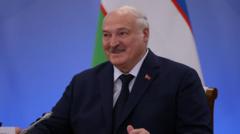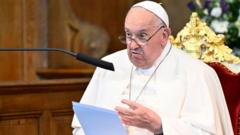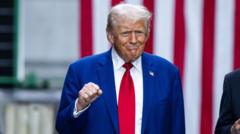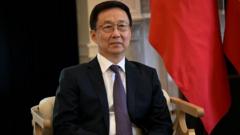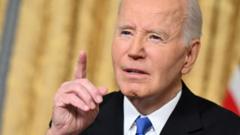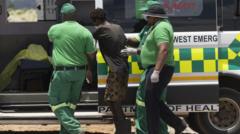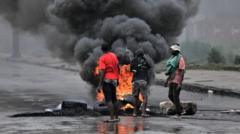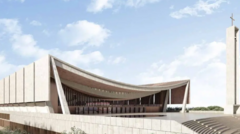Vote counting has officially begun in Ghana after a largely peaceful general election marked by a tragic incident in the north. As Ghanaians eagerly await the results, the election saw a showdown between former President John Mahama and Vice-President Mahamudu Bawumia, with critical implications for the West African nation's political future.
Vote Counting Commences in Ghana Amid Tense Climate

Vote Counting Commences in Ghana Amid Tense Climate
Ghana moves to elect new leadership following a successful general election while grappling with unrest in some regions.
In the aftermath of Saturday's voting, reports indicate that police have arrested four individuals connected to a violent episode at a polling station in Nyankpala, where an opposition parliamentary candidate's attempt to raise concerns was met with resistance from ruling party supporters. Troops have since been deployed to maintain calm following the incident. Nonetheless, the voting process in various areas went smoothly, with many citizens arriving before the break of dawn to cast their votes.
Polling centers concluded operations at 17:00 GMT, and results are slated for announcement on Tuesday. The closure of Ghana's borders until Sunday evening has been noted as an unusual precaution during this period of heightened political sensitivity.
This election guarantees a new president, as Nana Akufo-Addo steps down after two consecutive terms in office. Former President Mahama (NDC) is poised to challenge Vice-President Bawumia (NPP), who could potentially become Ghana's first Muslim president if he wins. Other prominent candidates include businessman Nana Kwame Bediako, appreciated by younger voters, and Alan Kyerematen, who recently parted ways with the ruling NPP.
With close to 19 million eligible voters, the political landscape remains competitive. Despite new legislation aimed at increasing female representation in politics, only Nana Akosua Sarpong Frimpomaa of the Convention People's Party remains in the presidential race. The late Akua Donkor's name remains on the ballot due to a disqualification of her successor.
As voters cast their ballots in 275 constituencies to elect new parliamentary representatives, historical patterns reveal a longstanding dominance of the NDC and NPP in presidential victories since 1992. Winning candidates must secure over 50% of the votes to eliminate the need for a run-off, which could occur in late December.
First-time voter Serwaa Yeboah Joshebeth emphasized the importance of elections in shaping the future, advocating for job creation. Her sentiments echo those of retired university worker Kojo Yeboah, 95, who stressed the need for education and youth employment. The election comes amid economic challenges, including significant inflation and high unemployment rates, particularly among the youth.
As the country braces for results, the forthcoming leadership could define Ghana's trajectory in addressing pressing issues affecting its citizens' livelihood and prospects.
Report by Idara Monday/BBC.
Polling centers concluded operations at 17:00 GMT, and results are slated for announcement on Tuesday. The closure of Ghana's borders until Sunday evening has been noted as an unusual precaution during this period of heightened political sensitivity.
This election guarantees a new president, as Nana Akufo-Addo steps down after two consecutive terms in office. Former President Mahama (NDC) is poised to challenge Vice-President Bawumia (NPP), who could potentially become Ghana's first Muslim president if he wins. Other prominent candidates include businessman Nana Kwame Bediako, appreciated by younger voters, and Alan Kyerematen, who recently parted ways with the ruling NPP.
With close to 19 million eligible voters, the political landscape remains competitive. Despite new legislation aimed at increasing female representation in politics, only Nana Akosua Sarpong Frimpomaa of the Convention People's Party remains in the presidential race. The late Akua Donkor's name remains on the ballot due to a disqualification of her successor.
As voters cast their ballots in 275 constituencies to elect new parliamentary representatives, historical patterns reveal a longstanding dominance of the NDC and NPP in presidential victories since 1992. Winning candidates must secure over 50% of the votes to eliminate the need for a run-off, which could occur in late December.
First-time voter Serwaa Yeboah Joshebeth emphasized the importance of elections in shaping the future, advocating for job creation. Her sentiments echo those of retired university worker Kojo Yeboah, 95, who stressed the need for education and youth employment. The election comes amid economic challenges, including significant inflation and high unemployment rates, particularly among the youth.
As the country braces for results, the forthcoming leadership could define Ghana's trajectory in addressing pressing issues affecting its citizens' livelihood and prospects.
Report by Idara Monday/BBC.


